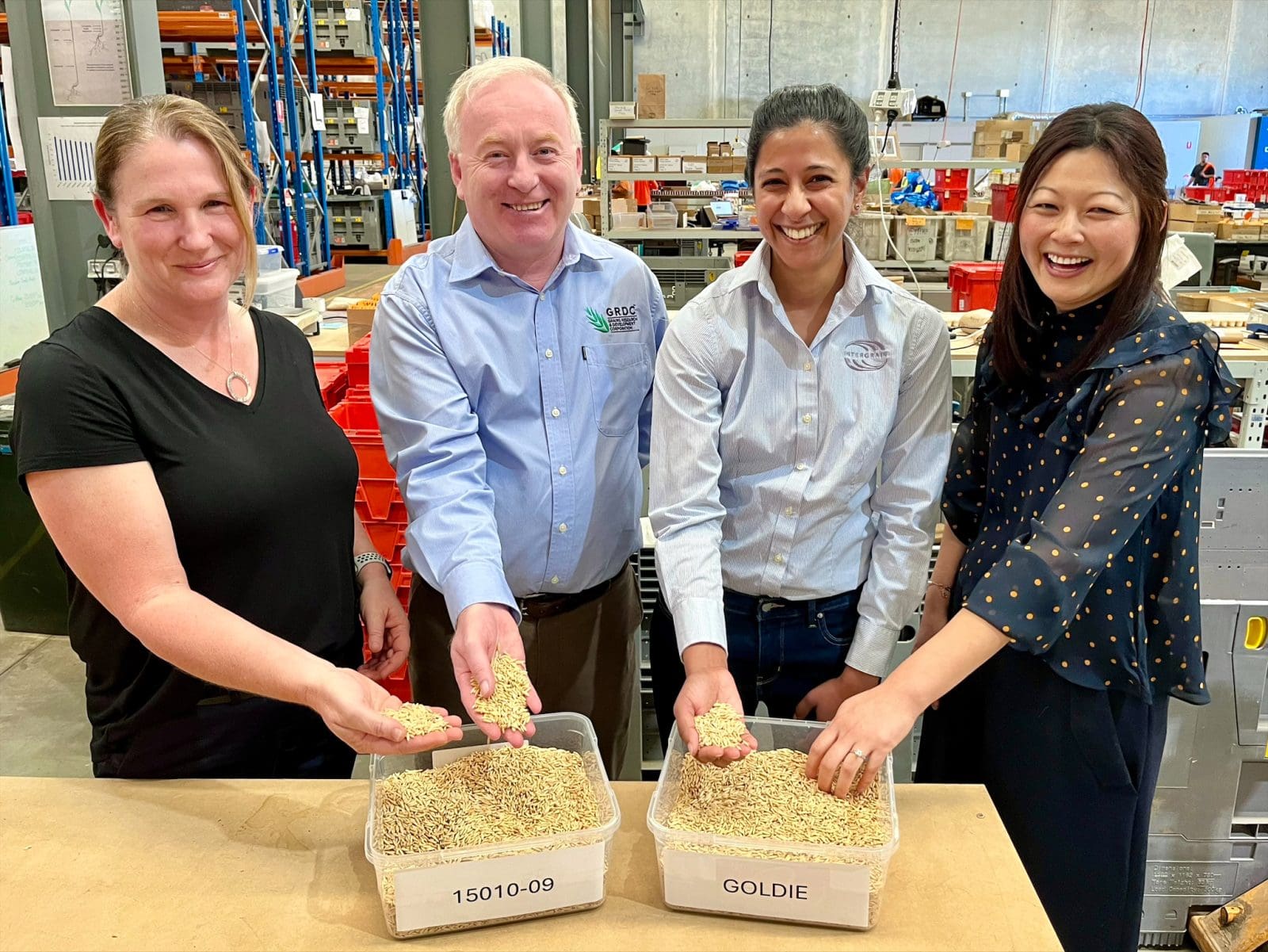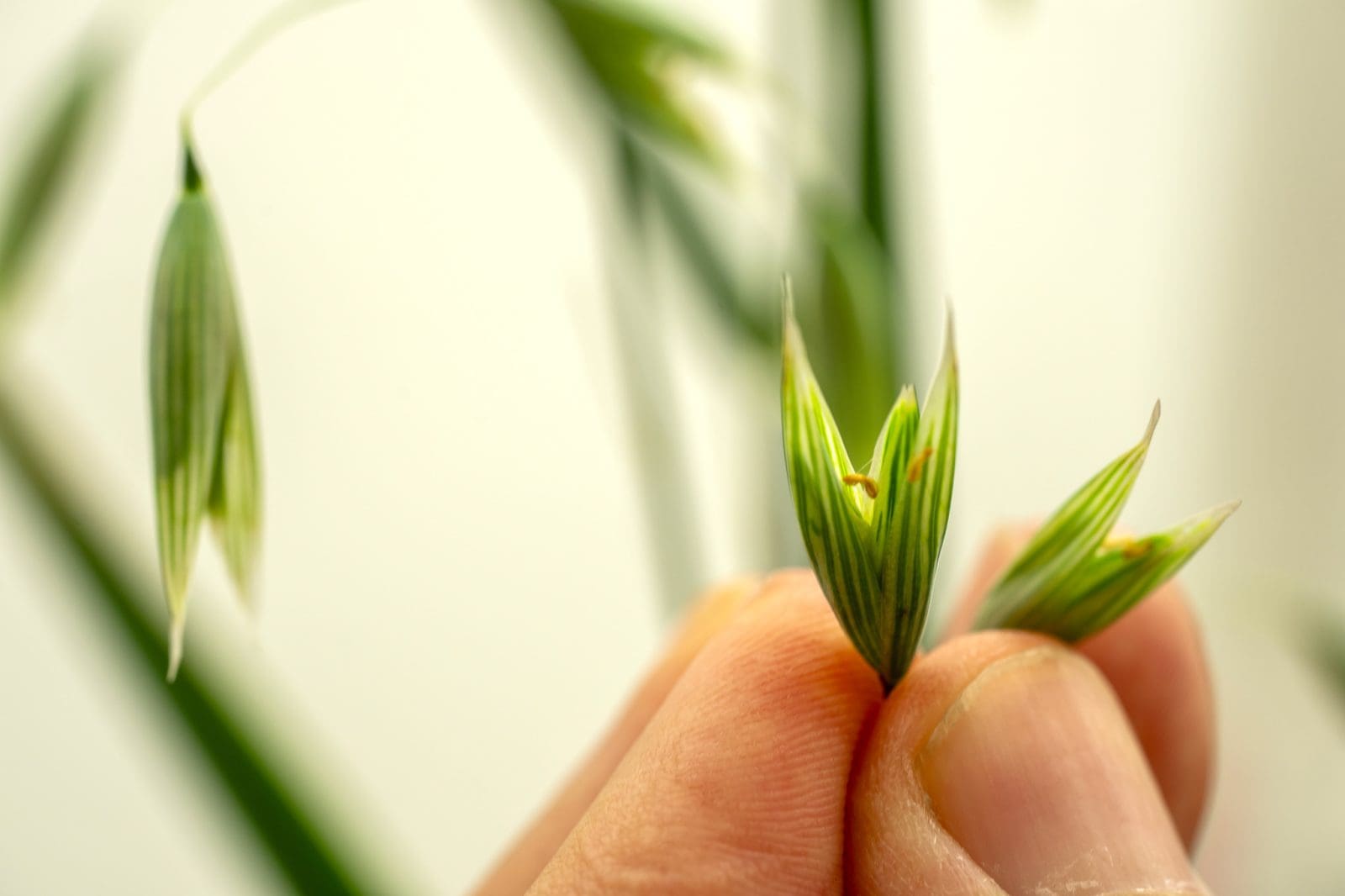
SARDI program leader for crop and pasture improvement Dr Janine Croser, GRDC managing director Nigel Hart, InterGrain research and business development manager Dr Dini Ganesalingam, and InterGrain cereal chemist Dr Haelee Fenton. Photo: GRDC
IN A MOVE to boost Australia’s position as a high-quality, value-added oat producer, a research-focused Oat Grain Quality Consortium (OGQC) has been launched.
Designed to capitalise on growing domestic and international market opportunities, the consortium is a collaborative Grains Research and Development Corporation (GRDC) investment aimed at addressing the crucial need for innovation in oat-quality research, informing oat-quality classification and market positioning.
Announced by GRDC managing director Nigel Hart last week in Perth, funding over five years includes $5.75 million from GRDC, and $6.7M from research and industry partners.
The consortium will be led by InterGrain and the South Australian Research and Development Institute, which will bring together a diverse group of organisations spanning the research, production, processing, and food and beverage manufacturing sectors.
“We know that the global demand for diverse and nutritious oat-based products is on the rise and there is a clear opportunity for Australian agriculture to lead the way in quality and sustainability. This is why GRDC has initiated and invested in this consortium on behalf of Australian growers,” Mr Hart said.
“This research will benefit the entire Australian oat supply chain by providing breeders with new traits that align with market demands, improving efficiency and reducing costs for processors, and expanding the range of oat-based products that manufacturers can offer consumers globally.
“Ultimately this work aims to position Australian oats as the go-to-product for consumers, both domestically and overseas, which will have significant flow-on benefits for our growers.”
The OGQC aims to capitalise on international demand in oats for food and beverage applications via targeted pre-breeding through three programs of activity, each supporting Australian oat pre-breeding research to understand key oat-quality traits.
Researchers will work with oat millers and food-and-beverage processors to develop industry-relevant thresholds for traits such as flavour and aroma, groat oil, beta-glucan and protein.
They will also work with breeding programs to identify and provide germplasm and molecular tools to rapidly develop new oat varieties suited to high-value, end-use market requirements.
GRDC genetic technologies manager for barley, oats and sorghum Michael Groszmann said for the investment to succeed, it was critical to have engagement from the post-farmgate sector.
“Pleasingly we already have a high level of direct project involvement from both millers and oat food-and-beverage manufacturers,” Dr Groszmann said.
InterGrain’s research and business development manager Dini Ganesalingam said the initiative would use the scale of InterGrain’s oat-breeding program to create tools that would aid in quantifying oat quality traits for industry classification via Grains Australia receival-points assessment.
InterGrain cereal chemist Haelee Fenton is leading work in the project investigating the trait selection intelligence of aroma and flavour compounds in oat foods and beverages.
Dr Fenton said the research will be integral to setting targets for InterGrain’s oat-breeding program.
As part of the project, InterGrain also has a co-design committee, which includes representatives from across the food and beverage sectors.
“This creates a direct line for consultation and feedback on oat processing and product research, which will inform the development of consumer-targeted oat varieties for Australian farmers to grow,” Dr Fenton said.
SARDI’s Program Leader for Crop and Pasture Improvement Dr Janine Croser said the initiative had the potential to be truly transformative for Australian oat quality and production research.
“Enhancing shelf life and milling efficiency may open new avenues for Australian oats in global markets – something that SARDI will be exploring intently in conjunction with our industry consultative committee and research partners,” Dr Croser said.
The consortium will also inform the classification considerations currently under review by Grains Australia, with clearer market differentiation helping to drive value in the commodity.
Grains Australia general manager classification Megan Sheehy welcomed the launch of the OGQC, saying it could help inform decisions by Grains Australia’s Oat Council and its new oat variety classification framework.
“Outcomes from the OGQC projects will play an important role in assisting the oat industry to map its pathway forward to achieve market-driven outcomes,” Dr Sheehy said.

The OGQC aims to capitalise on international demand in oats for food and beverage applications by supporting Australian oat pre-breeding research to understand key oat quality traits. Photo: Evan Collis/GRDC
Three programs outlined
1: Accelerating the development of an accurate and cost-effective high-throughput measurement method for key oat quality characteristics.
Led by InterGrain and co-funded by the WA Government’s Processed Oat Partnership program, this program will spearhead efforts to accelerate the breeding of high-quality oats through improved phenotyping capacity.
It aims to develop an accurate, rapid and cost-effective method for measuring oat-quality characteristics such as beta-glucan, protein and oil content to accelerate the breeding process and ensure faster access to superior oat varieties.
2: Discovery of desirable aroma, flavour and texture compounds for oat food/beverage applications.
Led by InterGrain in collaboration with: Curtin University; Murdoch University; Edith Cowan University; Agriculture Victoria; Shaanxi Normal University; Unigrain; Wide Open Agriculture, Fancy Plants; Oatly; Sanitarium; Uncle Toby’s; Blue Lake Milling; Quaker; Noumi; Seamild, and Australian Export Grains Innovation Centre.
It aims to help differentiate Australian oats in the market by providing breeders with actionable information on the genetic variation of “taste” compounds, and support breeding efforts to enhance the sensory appeal of Australian oats for existing and new oat products.
It will also provide industry and researchers with insights into desirable aroma, flavour and texture compounds for oats.
3: Modulating grain oil content of oats to improve suitability for milling and food/beverage ingredient development.
Led by SARDI in collaboration with the University of Adelaide, University of South Australia, and InterGrain, plus industry partners Unigrain, AEGIC and Grains Australia.
It aims to understand the constraints that oat grain oil content has on expanding milling processes for improved and novel oat products. It will initially establish industry-relevant oil thresholds for specific milling applications, then delve into the genetics and biochemical pathways determining oat grain oil content.
Findings will allow SARDI researchers to deliver to breeding programs novel low-oil oat lines with improved suitability for milling, broadening oats’ role as a versatile ingredient in a range of food and beverage products.
Oats snapshot
Australia produces around 1.5 million tonnes oat grain per year, with roughly 25 percent exported, and the balance used for seed, feed and human consumption.
Australia currently mills around 250,000-300,000t of oats per annum for the domestic and export markets, and Australian exports of processed oats are on par or exceed raw oat exports.
The market for Australian oat product has doubled since 2017, largely driven by unprecedented global demand for oat food-and-beverage items which is anticipated to continue at a rate of 5pc annual growth over the next five years.
Source: GRDC



HAVE YOUR SAY